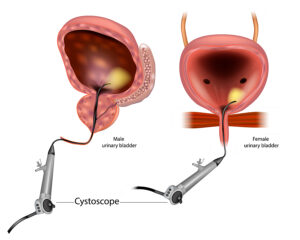At a Cancer congress in Madrid, Spain a new treatment against advanced bladder cancer was discussed at this year’s European Society for Medical Oncology Congress. The standard treatment for advanced bladder cancer is gemcitabine in combination with cisplatin or carboplatin. According to CNN the median survival with the standard chemotherapy is 16.1 months. In contrast, treatment with the new intravenous antibody drug enfortumab vedotin in combination with intravenous pembrolizumab resulted in longer survival. The combination yielded a survival of 31.5 months for advanced bladder cancer patients. This new immunotherapy method resulted in a 96% longer survival. The safety profile of the two approaches were similar. 55.9% of patients taking the combination immune therapy developed skin rashes or hyperglycemia, while 69.5% of those taking platinum chemotherapy developed this.
Other new findings about advanced bladder cancer treatment
Dr. Thomas Powles is a professor of urology cancer at the University of London and director of the Barts Cancer Centre in the United Kingdom. He said:” The problem with chemotherapy is although it works quite well initially, resistance occurs quickly, and the median survival for metastatic bladder cancer has been about a year. What this study showed is, we did a big, randomized Phase 3 study where we compared a new treatment — two new drugs — with standard chemotherapy,” Powles said. “And in this randomized trial, when you gave those two drugs together, you reduced the risk of death for this cancer by over 50%. So, you’ve doubled survival, with patients living twice as long, and we’ve got long-term durable remission.”
Erdafitinib study
A second study from the New England Journal of Medicine used erdafitinib in comparison to standard chemotherapy. Erdafitinib is a small molecule inhibitor of fibroblast growth factor receptor and is effective in the treatment of cancer. This study compared 136 patients on erdafitinib with 130 patients on chemotherapy. Patients treated with standard chemotherapy had a median overall survival of 7.8 months. This compares to 12.1 median survival for the erdafitinib group. Erdafitinib, a kinase inhibitor drug, is slowing the spread of cancer cells.
Side effects that led to death were less common with erdafitinib than with chemotherapy. Only 0.7% of erdafitinib patients had serious side effects versus 5.4% of chemotherapy patients.
Nivolumab study
Another clinical trial was recently published in the New England Journal of Medicine.
Nivolumab is an immune checkpoint inhibitor that was originally developed for treatment of intractable melanoma. However, subsequently it was found to be active also against lung cancer, kidney cancer and bladder cancer. In the clinical study mentioned above 304 patients with intractable bladder cancer were treated with standard chemotherapy alone. They were compared to 304 patients on standard chemotherapy plus nivolumab.
The median complete response with the nivolumab-combination therapy was 37.1 months. In contrast, with gemcitabine–cisplatin alone it was only 13.2 months. Side effects of the two treatments were about similar. The authors concluded that treatment with the immune checkpoint inhibitor, nivolumab plus standard chemotherapy with gemcitabine–cisplatin resulted in better survivals than treatment with gemcitabine–cisplatin alone.
Discussion
Immunomodulation is one of the newest approaches to cancer treatment. But at the Hope 4 Cancer Clinic immunomodulation is only one aspect of a comprehensive approach to cancer treatment.They mention that they restore the microbiome in the gut. Great detail is spent to a full spectrum nutrition. Detoxification and non-toxic cancer therapies are employed. Oxygenation helps to restore the acid/base balance. Immunomodulation with the newer agents mentioned above helps as well to combat cancer. Low-dose laser photodynamic therapy with various light frequencies helps to destroy cancer cells as well. These lasers activate a variety of sensitizers, which are taken up by cancer cells and lead to their destruction. Finally, the cancer patients are taught how to achieve spiritual and emotional well-being. The Hope 4 Cancer Clinic demonstrates that treatment with immunomodulation is best combined with other treatment modalities to improve patient survival.
Conclusion
Physicians used three different immune therapies to treat advanced bladder cancer. Erdafitinib vedotin, a kinase inhibitor drug, in combination with intravenous pembrolizumab resulted in a survival of 31.5 months for advanced bladder cancer patients versus 16.1 months with standard chemotherapy. Another clinical trial showed that patients on standard chemotherapy had a median overall survival of only 7.8 months for advanced bladder cancer. This compares to 12.1 months median survival for the erdafitinib group. Finally, nivolumab, an immune checkpoint inhibitor was combined with standard chemotherapy. When end stage bladder cancer patients were treated with this combination, they survived 37.1 months. In comparison, the control group with chemotherapy alone (gemcitabine–cisplatin) survived only 13.2 months. There is definitely better survival of patients when immunomodulation is used. The hope is that future immunomodulators will have a stronger effect against cancer with less side effects.






